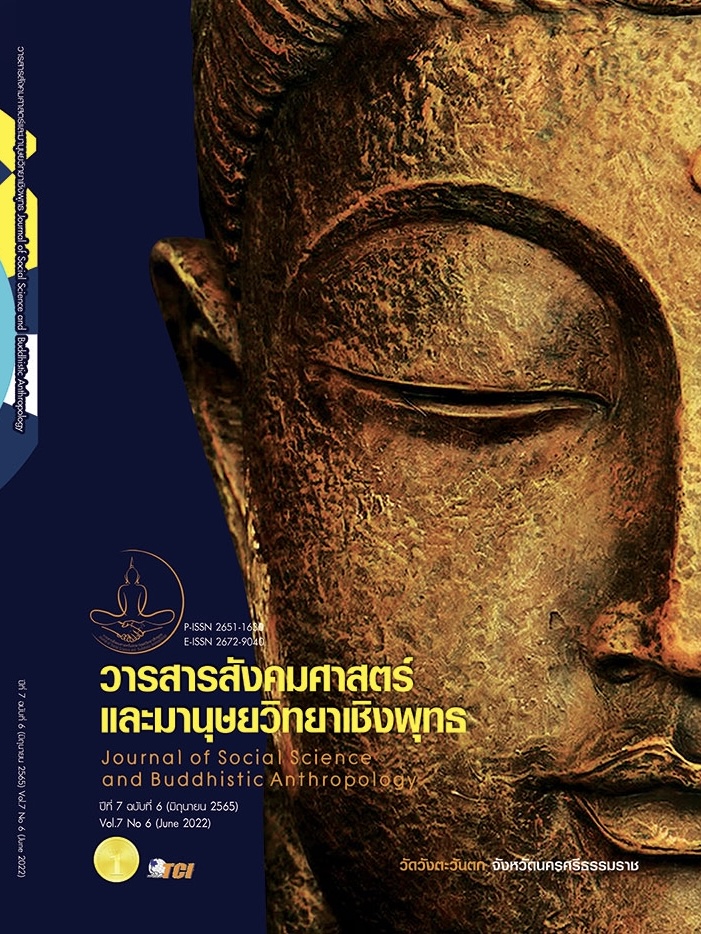FACTORS PREDICTING THE SELF CARE BEHAVIORS OF MUSLIM ELDERLY IN NAKHON SI THAMMARAT PROVINCE
Keywords:
Predicting Factors, Self-Care Behaviors, Muslim Elderly, Nakhon Si Thammarat ProvinceAbstract
The objectives of this research article were to 1) study the factors influencing self-care behaviors of the Muslim elderly, and 2) be able to predict self-care behaviors of the Muslim elderly in Nakhon Si Thammarat province based on personal factors, psychological factors, and social factors. This is a quantitative study in which the subjects consisted of 185 elderly Muslim people, who are 60 years old or older and live in Mueang Nakhon Si Thammarat District. A multistage randomization method was used based on the proportion of the population classified by villages and the information was collected by questionnaires. The instruments used include 1) questionnaires of personal data 2) questionnaires of self-care behaviors 3) questionnaires of elderly psychological factors 4) questionnaires of Social Factors. The content validity index of the questionnaire was 0.97, and a reliability test for Cronbach's alpha coefficient was 0.867. Data were analyzed using percentage, mean, standard deviation, and multiple regression analysis (Stepwise Multiple Regression Analysis) based on the importance of the input variables to the equation. The study's findings revealed that: 1) factors influencing self-care behaviors of the Muslim Elderly: psychological factors such as attitude, self-efficacy, and social factors in support of self-health care from family and health care support from all staff had a significant effect on elderly people's self-care behaviors at a high level. 2) Predicting self-care behaviors necessitates a secondary school education or higher, monthly income, extended family traits, positive attitudes toward self-care, and internal-external beliefs about self-care. We were able to predict the self-care behaviors of Muslim elderly people in Nakhon Si Thammarat Province by 75.6%, with a statistical significance of 0.05.
References
นิรัชรา ลิลละฮ์กุ และปัทมา สุพรรณกุล. (2563). พฤติกรรมการส่งเสริมสุขภาพและปัจจัยที่เกี่ยวข้องของผู้สูงอายุชาวไทยมุสลิมที่มีภาวะติดบ้าน: กรณีศึกษาจังหวัดยะลา. วารสารเครือข่ายวิทยาลัยพยาบาลและการสาธารณสุขภาคใต้, 7(2), 194-205.
นิราศศิริ โรจนธรรมกุล. (2563). ปัจจัยที่มีผลต่อพฤติกรรมการดูแลสุขภาพตนเองของผู้สูงอายุ ชมรมครุรัตน์มหาวิทยาลัยราชภัฎพระนคร กรุงเทพมหานคร. วารสารนวัตกรรมและการจัดการ มหาวิทยาลัยราชภัฎสวนสุนันทา, 5(ฉบับเพิ่มเติม), 115-128.
พัชรี รัศมีแจ่ม และคณะ. (2561). ปัจจัยทำนายพฤติกรรมส่งเสริมสุขภาพของชาวไทยมุสลิมที่มีภาวะความดันโลหิตสูงมีพฤติกรรมการส่งเสริมสุขภาพ. วารสารพยาบาลศาสตร์ มหาวิทยาลัยสยาม, 19(37),56-68.
ภาสิต ศิริเทศ และณพวิทย์ ธรรมสีหา. (2562). ทฤษฎีการรับรู้ความสามารถของตนเองกับพฤติกรรมการดูแลสุขภาพผู้สูงอายุ. วารสารทหารบก, 20(2), 58-65.
ยุภาพร นาคกลิ้ง และปราณี ทัดศรี. (2560). ผลของโปรแกรมการสร้างเสริมการรับรู้ความสามารถตนเองต่อพฤติกรรมสุขภาพของผู้สูงอายุโรคความดันโลหิตสูงที่ควบคุมระดับความดันโลหิตไม่ได้. วารสารสมาคมสถาบันอุดมศึกษาเอกชนแห่งประเทศไทย, 6(1), 27-35.
สรวงสุดา เจริญวงศ์ และคณะ. (2561). สถานการณ์การดูแลและความต้องการการดูแลระยะยาว สำหรับผู้สูงอายุที่มีภาวะพึ่งพิง ในชุมชนมุสลิมเขตชนบทภาคใต้ของไทย. วารสารเครือข่ายวิทยาลัยพยาบาลและการสาธารณสุขภาคใต้, 5(2), 231-246.
สโรชา อยู่ยงสินธุ์ และสุจิตรา สุคนธทรัพย์. (2558). ความสัมพันธ์ระหว่างความเชื่ออำนาจควบคุมทางสุขภาพกับพฤติกรรมสุขภาพ และคุณภาพชีวิต ของผู้สูงอายุในภาคตะวันออกเฉียงเหนือ. วารสารวิทยาศาสตร์การกีฬาและสุขภาพ, 16(2), 63-75.
สำนักงานสถิติแห่งชาติ. (2564). รายงานการสำรวจประชากรสูงอายุในประเทศไทย พ.ศ. 2557. กรุงเทพมหานคร: เท็กซ์ แอนด์ เจอร์นัล พับลิเคชั่น จำกัด.
สำนักงานสาธารณสุขจังหวัดนครศรีธรรมราช. (2562). ประชากรผู้สูงอายุจังหวัดนครศรีธรรมราช. เรียกใช้เมื่อ 8 กันยายน 2563 จาก https://www.nakhonsihealth.org/
สำนักอนามัยผู้สูงอายุ. (2563). รายงานประจำปี 2563 การส่งเสริมสุขภาพดีดูแลตนเองได้และมีคุณภาพชีวิตที่ดี. กรุงเทพมหานคร: สำนักอนามัยผู้สูงอายุ.
Anderson, R. E. (2010). Multivariate Data Analysis. New York: 7th Edition, Pearson.
Bandura, A. (1986). Social Foundations of Thought and Action: A Social Cognitive Theory. Englewood Cliffs. New Jersey: Prentice-Hall.
Cohen, J. (1969). Statistical Power Analysis for the Behavioral Sciences. New York: Academic Press.
House, J. S. (1981). Work Stress and Social Support. Reading, Mass: Addison-Wesley.
Orem, D. E. (1991). Nursing Concepts of Practice. (4nd ed). New York: Mc Graw Hill Book.
Rotter, J. B. (1981). Generallized Expectancies for Internal versus External control of Reinforcement. Psychological Monographs: General and Applied, 80(1) ,1-28.
Schaefer, C. et. al. (1981). The health-related functions of social support. J Behav Med Dec, 4(4), 381-406.
Downloads
Published
How to Cite
Issue
Section
License
Copyright (c) 2022 Journal of Social Science and Buddhistic Anthropology

This work is licensed under a Creative Commons Attribution-NonCommercial-NoDerivatives 4.0 International License.









